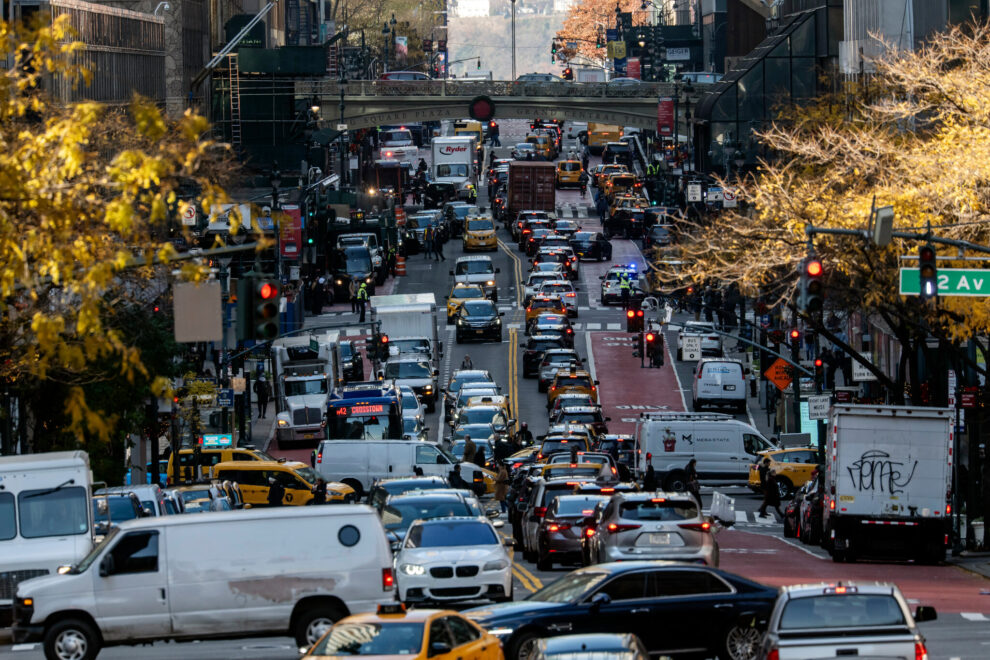The Metropolitan Transportation Authority has approved steep tolls for drivers entering Manhattan south of 60th Street as it creeps closer to enacting a congestion tolling plan staunchly opposed by New Jersey officials.
The board’s Wednesday vote will launch a 60-day public comment period on the proposal to charge drivers entering the congestion zone $15 per trip, or $24 for small trucks and $36 for larger ones. The period is not expected to upend the policy’s launch late in the spring.
“Over my 35-plus years of involvement in New York City government and politics, I generally have arrived at the conclusion that if everybody is mad at you, you’ve done your job. And I think we’ve achieved that here,” said John Banks, a member of the Traffic Mobility Review Board that drafted the plan. “This is a great piece of public policy.”
The proposal, approved in a 9-1 vote Wednesday, includes some tolls that are steeper than previously reported. Commuters without an E-ZPass account would face tolls that are 50% higher: $22.50 for commuter vehicles, and up to $54 for large trucks.
Those tolls would climb up to 25% higher on high-traffic gridlock alert days set by the New York City Department of Transportation. There were 19 such days in 2023, and a commuter without E-ZPass driving into the congestion zone during one of these days would pay as much as $28.13 in congestion tolls.
A provision of the plan allows the MTA to raise or lower the tolls by 10% within the first year following their enactment.
MTA officials expect the policy will cause roughly 110,000 drivers to switch to public transportation, said Janno Lieber, the agency’s chairman and CEO.
The policy is meant to fill the MTA’s capital coffers, generating $1 billion in annual revenue, but New Jersey officials have decried the plan, saying it will fund New York City infrastructure out of New Jerseyans’ pockets while offering the Garden State nothing in return.
“Even Governor Hochul said the congestion tax is just a plan to rescue the MTA from years of billion-dollar budget holes and mismanagement. The MTA lost $700 million last year alone to people who didn’t pay to ride — fare skippers. The MTA is a hot mess and just desperate for cash,” said Rep. Josh Gottheimer (D-05), a vocal congestion pricing critic.
The plan’s supporters say congestion pricing will reduce gridlock in Manhattan while cutting vehicle emissions in the city, all while funding improvements to MTA infrastructure the agency will otherwise be unable to meet in future years.
“To the fans of congestion in New Jersey who give short shrift to transit improvements their own constituents will benefit from, we say this: Get on board or get out of the way,” said Lisa Daglian, executive director of the MTA’s citizens advisory committee.
Opponents have warned that congestion tolls will burden low-income commuters and those without easy access to public transit with steep costs while overloading the region’s already strained trains and buses.
Others have cautioned the policy will lead to toll shopping, worsening traffic in and around the congestion zone.
“Your congestion pricing plan is a folly,” said Lee Berman, a Democratic district leader from Manhattan’s lower east side. “It is a tax on the working middle-class residents of lower Manhattan, those who live paycheck-to-paycheck and the working poor, to prop up the MTA, an agency that has for generations shown that it is irresponsible with every single dollar it ever gets its hands on.”
The MTA should crack down on fare and toll evaders, who cost the agency roughly $700 million in lost revenue in 2022, before imposing congestion tolls, Berman said.
Though commuters whose annual income is less than $50,000 can qualify for discounted tolls, that discount only goes into effect starting on their 11th trip into the congestion zone during a given month.
Such a commuter entering the congestion zone five times per week would pay nearly $3,000 in new tolls each year. The discount is only available to drivers with E-ZPass.
“I, in good faith, cannot support this plan. If you do this math, 15 times five is $75,” said Andy Pollack of Passengers United. “If you’re regularly driving a car into Manhattan every day, you’re basically saying to all these low-income New Yorkers, ‘Well, sorry, we’re basically going to price you out.”
Despite Wednesday’s vote, congestion pricing could still face a winding and complicated path to enactment.
New Jersey in July sued the U.S. Department of Transportation, alleging the agency ignored environmental and financial impacts the policy would levy on New Jersey residents.
Fort Lee Mayor Mark Sokolich and a Fort Lee resident later lodged a federal class action suit against the MTA, federal regulators, and the Triborough Bridge and Tunnel Authority that charges the proposal will degrade air quality and worsen traffic in Bergen County.
Those lawsuits could delay congestion pricing and complicate the MTA’s plan to fund its capital budget even if the complaints ultimately prove unsuccessful.
“Every lawsuit and delay creates risks to capital project funding, which in turn leads to more debt and more pressure on the operating budget. Riders’ worst-case scenarios — service cuts, drastic fare hikes, and falling farther away from a state of good repair — become real possibilities if we can’t implement congestion pricing sooner rather than later,” said Kara Gurl, planning and advocacy manager for the MTA’s citizens advisory committee.
Source: New Jersey Monitor












Add Comment